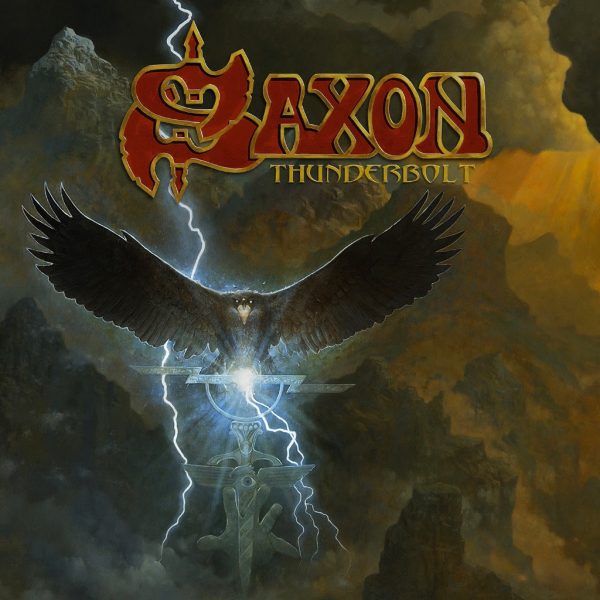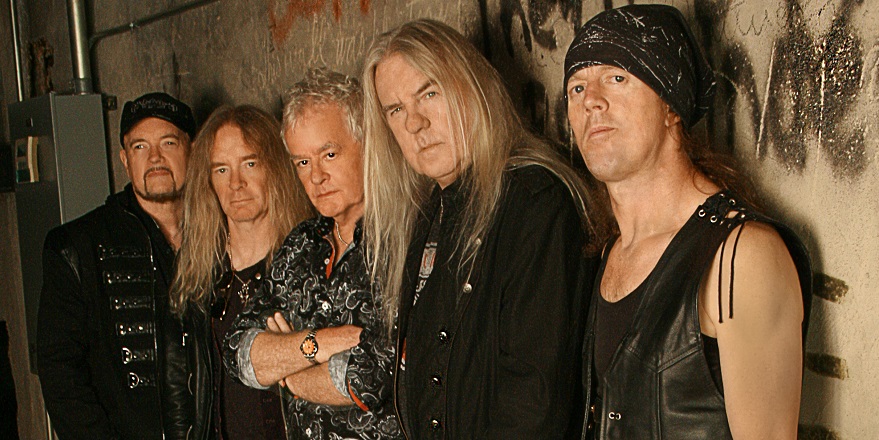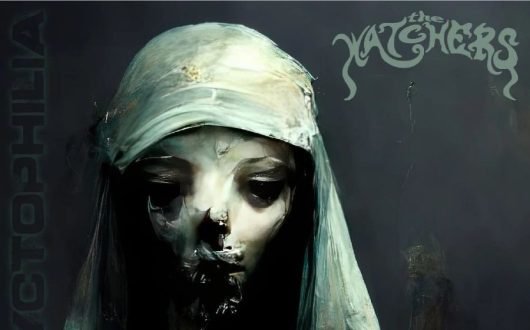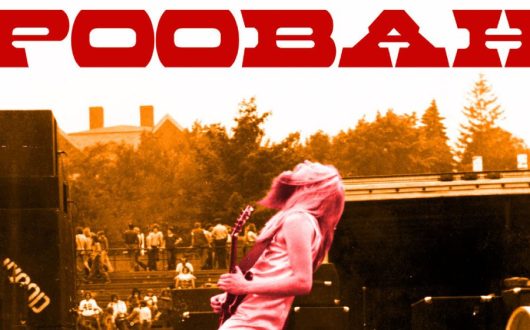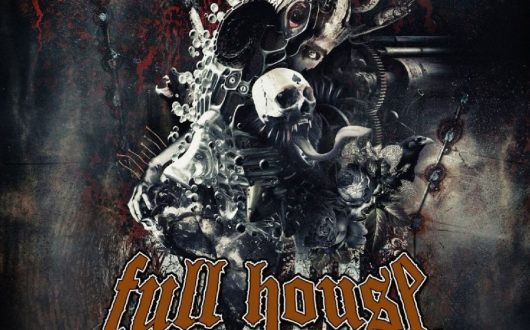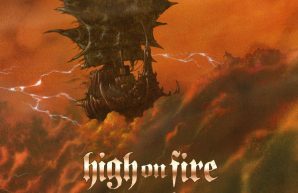Interview with Biff Byford by Adrian Hextall
SAXON isn’t wasting any time in 2018. Following the critically acclaimed release of ‘Battering Ram’ in 2015, the heavy metal giants are set to release their latest studio album, Thunderbolt, on February 2nd via the Militia Guard label (Silver Lining Music).
The new album Thunderbolt will feature original Artwork by long time Saxon collaborator Paul Raymond Gregory.
“This is album 22 and it’s called Thunderbolt. It’s a Storming Smashing Thundering collection of tracks we’ve been crafting with Producer, Andy Sneap and it’s finished ready to be unleashed.
Prior to that however, we have a rather special treat for fans in the shape of Decade Of The Eagle. A retrospective that spans the band’s first nine albums and represents the very best of the first decade of their astonishing career during which time Saxon notched up five Top 40 albums and four Top 20 singles. These 4LP (180g vinyl) and 2CD deluxe editions are in a gatefold sleeve that features a special metallic embossed coin on the cover. They also include new liner notes by frontman Biff Byford that document the decade and which are accompanied by rarely seen and classic photos from the era.
MGM: The “Anthology” then, the period where you guys became significantly well-known. Opportune time came about– You were talking about doing albums in less than a year, back in the day when you were doing singles as well, it’s all changed now. You must look back on that as either, “My God, how did we ever fit it all in or is it actually with fun memories as well?
BB: It was a hectic period. We were bashing albums out and singles on a regular basis. I think everybody else was as well. We were probably more prolific than some other bands. Well, that was a good thing. We felt as though releasing two albums in five months was too much though.
MGM: A little bit extreme?
BB: I think the record company thought we were a flash in the pan. They didn’t want people to forget about us but it would be best if we’d done more touring on “Wheels of Steel” and kept the next album– We could have written it but just kept it in the box. As it happens, we had three mega-ly massive albums in the space of the year as well. I only said the demand was there because people were buying them and then millions sold.
MGM: The Decade of the Eagle release contains some great liner notes from you. Really fascinating. You were saying about the flash in the pan piece and both the label and the management have that view which is why you then did the immediate five months later follow-up. Was that annoying for you at the time? Did you really feel like, “Well, come on, give us a chance here?” Why is there no faith in the band?
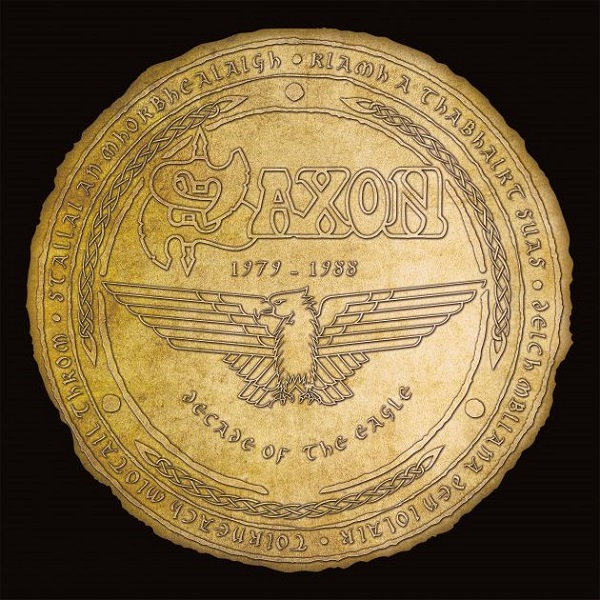
BB: No, I don’t think so. I simply did what they wanted us to do basically. We were always full of ideas and pent-up aggression and emotions. We released it all in a huge tsunami of music…
MGM: It’s such a rapid deployment, wasn’t it?
BB: We had the ideas. Yeah. Yes. The chemistry of the band was great. We were cooking and– I think at that early period. The thing is once you’ve made an album and put it out, you’re really on the next album anyway more or most immediately and mentally. I know you’re touring on that album, you’re playing the songs live, but on songwriting, you’re already thinking about the next album.
MGM: Of course, and I suppose on the live side of things, there comes a point when you’ve got to be thinking what can we add now which is new material because we played this to death, what comes up next.
BB: The deal then was the same deal now. You tour on an album. I suppose thinking from a record company point of view, the point of another album out and do another tour was a great promotional tour. They were using our tours to sell the album but they were just doing it very quickly. It was a bit brutal for us.
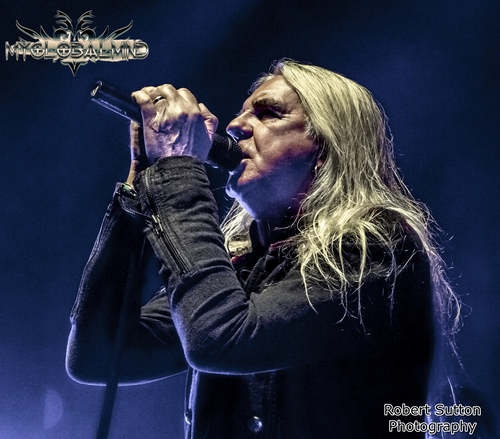
MGM: Looking as who has worked on the albums as well. The different producers you had on several of those albums as well.
BB: We had the same one on the first two, the first, second and third. A friend of ours did the first one. Then we’re talking about the Big 3. We had two producers on those three.
MGM: The choices of producers aren’t necessarily the ones you would have naturally chosen. An A&R man, like Pete [Hinton from record company Carrere] for example.
BB: I don’t think they’re the ones we wanted but we were comfortable and happy. He knew the band. He knew what was good about Saxon and what was bad. He sort of threw out what was bad and left what was good. He did a great job actually. Arguing the point that at that time we were tending to be a bit proggy about the first album, a little bit mystical, strummy, acoustic thing. He just thought that that was a waste of space. We should be more like “Stallions of the Highway” which is off the first album. That was the way people perceived us to be. That is how we work. Everything else was a little bit musical.
MGM: The pace with Jeff [Glixman] as well, an American guy producing you on “Power & the Glory,” and your comments around the fact that it could have so easily been done with that gloss and sheen which came in the big American albums.
BB: He did a great job. Jeff.
MGM: He kept the roots of the band in there.
BB: He was a fan of British bands. It does help. He’s a great producer, Glixman. There’s no doubt about it. I mean a lot. I think he was struggling with a few problems with his life but he did a great job, a great Hammond player. We used to jam somewhere. There’s tapes of that album, and on the tapes are the band jamming with him playing Hammond over doing different stuff there.
MGM: Giving you almost a bit of that Deep Purple feel in the music.
BB: Yeah, definitely. He was into that stuff. He was a keyboard player.
MGM: Wonderful. Do you think they’ll ever see light of day? Those tapes?
BB: He must have them unless he sent to them to the label. The thing is they’d just used to keep a quarter inch tape reel rolling the whole time. So it recorded everything, all the talking, all the everything.

MGM: Do you ever wonder what might have happened if you’ve gone down the American route? I mean obviously he could have given you that big US sheen album approach. Do you think it would have changed the band’s direction if that’s the way to come out?
BB: I don’t think so. “Crusader” was a bit of a more sort of produced album than “Power & Glory” I think. Crusader on there, which is a killer song. It’s hard to destroy a song like – you can be the worst producer in the world. Crusader is still a great song.
I think, generally, bands, they get too involved with perfection of music on albums. To tell you the truth, I don’t think the fans give a shit. I just think they want a great performance. They’re not bothered really of the bass drum isn’t perfect or the guitar sounds more like a washing machine. You know what I mean?
MGM: Yeah.
BB: It’s just how all the band sound together, the chemistry of the band and all the songs great.
That’s where bands like us lost a plot a little bit because we’re trying to make up more perfect albums. By doing that, I think you lose a bit of the aggression. That’s what I’m saying. Whereas maybe Pete would stay with us and produced for quite a lot of albums, the same manager as well. I think as a unit they were probably more focused than we were, where they were going. Back in the early days, we were pretty focused and we knew what we were doing.
MGM: If you look at lots of the latter period albums as well where Paul Raymond Gregory has done the artwork for you. There is that sort of natural theme going through all of them. They then carry a certain feel, don’t they, maintains that band focus as well?
BB: They do, yeah. If I look back at the legacy of albums, there’s some fantastic pieces of work, regardless of whether you’re into them at the time. If you listen to them now, they all have great, great tracks on them. They all have their great moments.
A lot of people reviewed the recent collection of those albums and didn’t even listen to them and that they just rehashed original reviews of them from back in the day.
When you listen to them, there’s some fucking great stuff on that. It really is. Groundbreaking stuff actually.
MGM: Nowadays in terms of the people that you’re using around production and the mixing, the engineering, is that all streamlined as well now? Or, do you have a mix of people in there?
BB: We’re quite a lot of people. If we like a producer we’ll stay with them. There comes a time when you have to move on because it becomes too familiar. You know what I mean?
MGM: I can understand that.
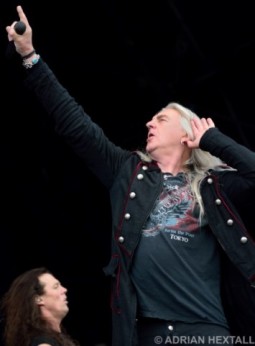
BB: Andy Sneap produced the new [Thunderbolt] album. He didn’t produce the last one, he co-produced it with me. This is the first album he’s actually producing. He’s done a great job. I’ll let the reins go and let him do the work that I would normally do. Fiddling around them or making sure everything, the solos, are great and blah blah blah. He’s done all that.
MGM: It’s funny you say about, “Do we really care about who as producer to whatever?” But Andy is one of those people that you see his name attached to it and you do think, “I’ll take a bit of notice here.”
BB: Andy approached us– We knew Andy from way back in Sabbat. They supported us when he was only 17 at the time. They supported us in Germany. He came to see us at a festival. We played together and he went, I’d like to one of the albums so bear me in mind. Yeah?
Maybe two or three years later we got together and we made an album. Or mixed an album, which was Sacrifice, I think. That was the first one he did. The one before that Toby Jepson did with me and a guy in America mixed it call Mike Plotnikoff. We do use different people, you know, sometimes, just to get an angle, a different angle on things. We are pretty happy with Andy. He is pretty cool. He’s got one foot in the modern and one foot in the classic. He’s good for us because he never makes me mind what Saxon is. Are they a heavy rock band with a bit of metal or they a metal band with a bit of hard rock? We like cross that bridge, don’t we?
MGM: Yeah, definitely.
BB: We can be in classic rock and metal hammer. You know what I’m saying?
MGM: Yeah, you play Bloodstock as comfortably as you did Rambling Man this summer, for example.
BB: I think that’s a great thing. It confuses some people because they like to know if you’re hardcore or if you’re this. You know, we don’t have a pigeonhole. We go in and out of pigeonholes all the time. We eat pigeonholes. But for us, it’s a good place to be because we love metal music but we love rock and roll as well. In tours, it’s all rock and roll. But we can be a bit hard rock, we can be heavy, we can be a bit proggy, we’re in a good place and do what we want.
MGM: I’d agree with that so it’s been as much fun seeing you play at metal festivals for example with the other bands on the bill as it was, well, that Friday night at Rambling Man this year. That was absolutely fantastic. I thoroughly enjoyed that.
BB: It was a great gig. A great audience.
MGM: I didn’t realise until you’d said that it was 31 years since you last had a headline slot…
BB: Since Reading. In England, not in Britain.
MGM: Well no, the first time I saw you headline at a festival was in Wacken in 2009. I was blown away because I didn’t appreciate you guys would have a show that impressive and the eagle lights up at the back and all that. It’s like, bloody hell, this is what we miss out on in the UK. You can only go 23 miles over the channel and it’s a whole different experience for Saxon fans, isn’t it?
BB: I mean we’re playing that right now. The profile’s come up a lot in the UK in the last two or three years, especially.
MGM: What do you think has driven that? I mean obviously there is a lot more exposure with re-releases and the vinyl boxes coming out and whatever, but…
BB: I don’t know really. I mean a lot of bands have had it and Motörhead had it. The had a huge resurgence before Lemmy died. I think when you get to a certain point in your career and you’re still doing it live and still making great albums, I think a certain amount of respect comes with that. I think the magazines tend to look at you in a different way, some of the great guys from the old days were still around rather than the big headed twats, who were they kidding? You know what I mean?
MGM: I do.
BB: That mentality, so I think it all changes…
MGM: It’s the fact you sort of come out the other end and you’re still there and you’re still going and it sounds as good as ever.
BB: And we’re still more or less doing the same thing. We’ve gone full circle around whereas we’re just writing stuff that we love. And it’s all guitar driven, melodic driven stuff.
MGM: That means a lot me. It’s got to have some melody in there for me to appreciate it. I can’t go and listen to a death metal band or something like that because I can’t hear the melody in it very easily.
BB: It’s all attitude. There’s nothing wrong with it.
MGM: It grates after a while.
BB: It’s all right if you’re in the circle pit or moshing. But if you just sat in the back listening as a music buff, it can be a bit grating. Without any melody.
MGM: Yes, I agree. Whereas you guys…
BB: Some hardcore bands mix it up, like Killswitch Engage or something. They do have a lot of melody in their songs so you can listen to that sounds cool. Other bands, it’s too hardcore for two hours. Unless you are in the circle pit, then it’s extremely good fun.
MGM: But you almost lose the musical element to that point because it’s about the experience rather than the music.
BB: That’s right. We have a lot of this going on in big festivals and things. And really could be anybody playing as long as the beat is great and they’re all having a great time.
MGM: We also caught you over in the Czech Republic for Masters of Rock and again that was another good festival. Is that the norm? Is that typically your summer? Certainly, you say now with the profile of the band over the last few years? You do seem to be picking up a lot of festival slots.
BB: This year we have made a conscious decision to up our profile of the band at festivals and we said, “Look, all right we’re not the flavour of the month. We’re not anything new or we’re not like Ghost.” We are a great band, but they’re not a new band, they’re not an old band from the ages, but they’re happening. I’m just saying what we bring is a catalogue of songs that are in rock DNA and those songs have been played by the same people that wrote them. That’s why we should be headlining festivals.
Denim and Leather, those songs are massive. They are bigger than the band and we should be playing them in a headline situation like with eagle and the lights and that’s the decisions that we made and if the festival don’t wants us to do it, then we don’t play them. It’s a gamble, isn’t it for a festival to put a headliner on.
MGM: Absolutely.
BB: You know what I mean? But yeah they took the gamble and we did ten headlines shows and a couple of co-headline shows so it’s pretty good.
MGM: Will we see you back at Bloodstock again? Given Paul is doing the artwork for the next album and his connection to the festival?
BB: Again it comes down to the headlining thing. There’s this story– things going on behind the scenes that are their business. I can give you an example. They want us to play next year. Judas Priest are playing and we’re out with Priest in America.
MGM: So a natural fit, then.
BB: And we said we’re not doing it. We’ll do it with Priest because we love Priest and we’re out with them anyway. So we’ll do it. But we want to go on before them. But they said no, you have go on third, and we were like “no”.
MGM: Fair enough.
BB: Fair enough. I think they’re putting Emperor on.
MGM: In front of Priest?
BB: Yeah, which is all right. But it didn’t really go together like peas in a pod.
MGM: It doesn’t really gel, does it?
BB: But whatever, it’s that thing that sees themselves as more of a hardcore festival, so fair enough.
MGM: The harder edge of the metal, I suppose.
MGM: Just coming back in terms of the live music to Decade Of The Eagle as it’s come out, now there is a mix of versions of songs on that. Some of which have been live choices as opposed to the studio tracks. What drove your choices for picking the ones you did?
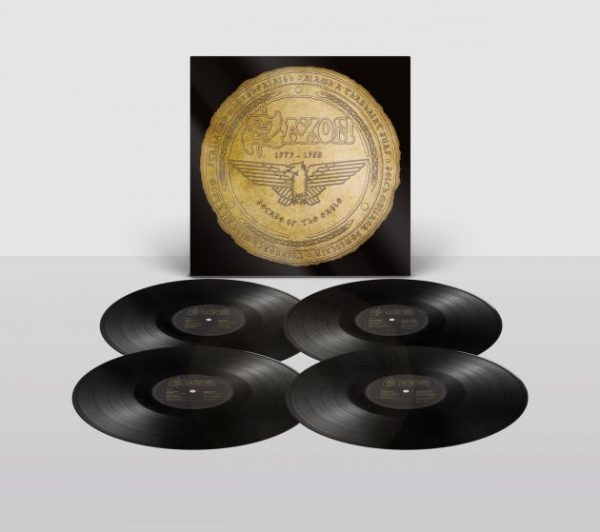
BB: The thing is they sent me a list of songs that they’d like to put on. Some of them I like and some I didn’t. I just thought for instance, on Innocence Is No Excuse, I think one of the key tracks on that album is Broken Heroes, it’s a big song around the world, for whatever reason it is, and Rock and Roll Gypsies. So I thought we would put something on there that would go down live and that people know rather than obscure tracks. It’s like Ride Like the Wind, for me it’s the best song on Destiny. Although it’s not ours, we made it ours. So it’s a great version.
The collection is a snapshot of that decade. I’m sure there will be more releases coming. Picture discs and vinyl boxes and all sorts of things. It’s a bit of… I’ll tell you what it is. It’s a bit like a seventies’ sampler, isn’t it? Back in the day when you used to get a vinyl with eight bands on there. This is just our taste of the decade, in our decade, the first decade of the band really. So it’s a snapshot.
To order your copy of Decade of The Eagle please go too: www.pledgemusic.com/saxon
Thunderbolt 2018 European Tour – Part 1
Fri February 23 – UK, Cardiff University
Sat February 24 – UK, Cambridge Corn Exchange
Sun February 25 – UK, Hull City Hall
Tue February 27 – Holland, Tilburg 013
Wed February 28 – Germany, Saarbruecken Garage
Thu March 1 – Germany, Hannover Capitol
Fri March 2 – Germany, Frankfurt Batschkapp
Sat March 3 – Germany, Dresden Schlachthof
Tickets from the usual sources:
